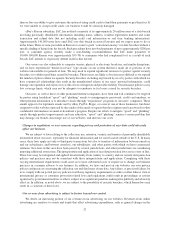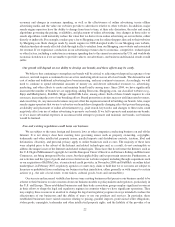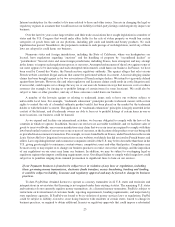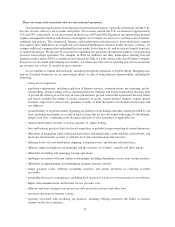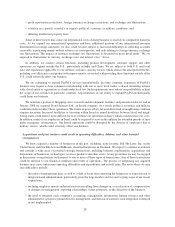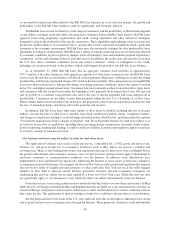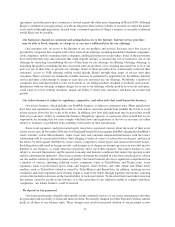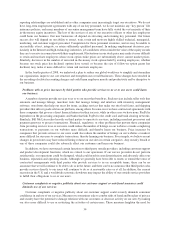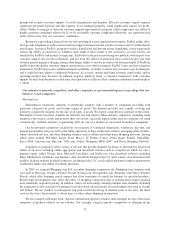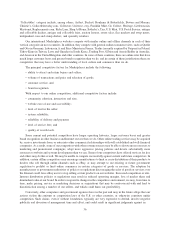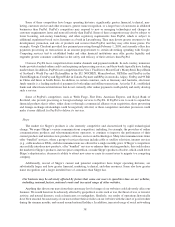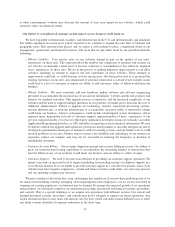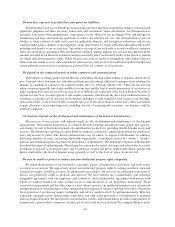eBay 2008 Annual Report Download - page 38
Download and view the complete annual report
Please find page 38 of the 2008 eBay annual report below. You can navigate through the pages in the report by either clicking on the pages listed below, or by using the keyword search tool below to find specific information within the annual report.we are unable to fund receivables related to the Bill Me Later business in a cost-effective manner, the growth and
profitability of the Bill Me Later business could be significantly and adversely affected.
The Bill Me Later service is offered to a wide range of consumers, and the profitability of this business depends
on our ability to manage credit risk while attracting new consumers with profitable usage patterns. Bill Me Later
approves loans using proprietary segmentation and credit scoring algorithms and other analytical techniques
designed to analyze the credit risk of the specific transaction. These algorithms and techniques may not accurately
predict the creditworthiness of a consumer due to, among other factors, inaccurate assumptions about a particular
consumer or the economic environment. Bill Me Later may also incorrectly interpret the data produced by these
algorithms in setting its credit policies. Bill Me Later’s ability to manage credit risk may also be adversely affected
by economic conditions, legal or regulatory changes (such as bankruptcy laws and minimum payment regulations),
competitors’ actions and consumer behavior and other factors. In addition, the credit crisis and current recession in
the U.S. may affect consumer confidence levels and reduce consumers’ ability or willingness to use credit,
including our transaction-based credit product, which could impair the growth of the Bill Me Later business.
As of December 31, 2008, Bill Me Later had an aggregate consumer loan portfolio of approximately
$597.6 million. Like other businesses with significant exposure to losses from consumer loans, the Bill Me Later
service faces the risk that account holders will default on their payment obligations, resulting in accounts becoming
uncollectible, and the risk of potential charge-offs related to the loan portfolio. The nonpayment rate among Bill Me
Later users may increase due to, among other things, worsening economic conditions, such as the current recession
in the U.S., and higher unemployment rates. Consumers who miss payments on their loans often fail to repay them,
and consumers who file for protection under the bankruptcy laws generally do not repay their loans. The age and
rate of growth of a consumer loan portfolio also affects the rate of missed payments and loans charged off as
uncollectible. Consumers are less likely to miss their payments within the first 12 to 18 months of a loan’s term.
When a lender makes fewer loans than it has in the past, the proportion of new loans in its portfolio will decrease and
the rate of missed payments and charge-offs in the portfolio will increase.
In addition, Bill Me Later faces other risks similar to those faced by PayPal, including the risk of systems
failures, security breaches or other loss of customer data, fraud, intellectual property claims, compliance failures,
and changes to regulations relating to credit offerings described in these Risk Factors, including under the captions
“Government inquiries may lead to charges or penalties” and “If our Payments business is found to be subject to or
in violation of any laws or regulations, including those governing money transmission, electronic funds transfer,
money laundering, banking and lending, it could be subject to liability, licensure and regulatory approval and may
be forced to change its business practices.”
Our business and users may be subject to sales tax and other taxes.
The application of indirect taxes (such as sales and use tax, value-added tax, or VAT, goods and services tax,
business tax, and gross receipt tax) to ecommerce businesses such as eBay and to our users is a complex and
evolving issue. Many of the fundamental statutes and regulations that impose these taxes were established before
the growth of the Internet and ecommerce. In many cases, it is not clear how existing statutes apply to the Internet or
electronic commerce or communications conducted over the Internet. In addition, some jurisdictions have
implemented or may implement laws specifically addressing the Internet or some aspect of electronic commerce
or communications on the Internet. For example, the State of New York recently passed new legislation that requires
any out-of-state seller of tangible personal property to collect and remit New York use tax if the seller engages
affiliates in New York to perform certain business promotion activities. Several ecommerce companies are
challenging this new law, which was recently upheld by a lower level New York court. While this new law does
not specifically apply to our businesses it may adversely affect our sellers and indirectly harm our business.
From time to time, some taxing authorities have notified us that they believe we owe them certain taxes. In May
2008, the City of Chicago notified both eBay and StubHub that they are liable for a city amusement tax on tickets to
events in Chicago, irrespective of the location of the buyer or seller, and has filed suit to enforce collection of taxes
they claim are due. The application of similar existing or future laws could have adverse effects on our business.
Several proposals have been made at the U.S. state and local level that would impose additional taxes on the
sale of goods and services or communications through the Internet. These proposals, if adopted, could substantially
30



